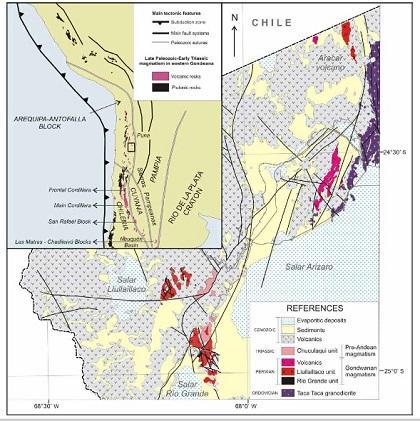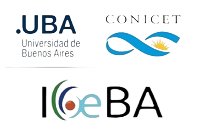Stella Poma, Eduardo O. Zappettini, Sonia Quenardelle, João O. Santos, † Magdalena Koukharsky, Elena Belousova, Neil McNaughton.
2 014
Andean Geology 41 (2): 267-292. May, 2014
We have carried out zircon U-Pb SHRIMP dating and Hf isotope determinations as well as geochemical
analyses on three plutonic units of Gondwanan magmatism that crop out in NW Argentina. Two episodes of different age and genesis have been identified. The older one includes gabbros and diorites (Río Grande Unit) of 267±3 Ma and granitoids (belonging to the Llullaillaco Unit) of 263±1 Ma (late Permian, Guadalupian); the parent magmas were generated in an intraplate environment and derived from an enriched mantle but were subsequently contaminated by crustal components. The younger rocks are granodiorites with arc signature (Chuculaqui Unit) and an age of 247±2 Ma (middle Triassic-Anisian). Hf isotope signature of the units indicates mantle sources as well as crustal components. Hf model ages obtained are consistent with the presence of crustal Mesoproterozoic (mainly Ectasian to Calymnian (TDM(c) =1.24 to 1.44 Ga-negative Hf (T) ) and juvenile Cryogenian sources (TDM=0.65 to 0.79 Ga-positive É›Hf (T)), supporting the idea of a continuous, mostly Mesoproterozoic, basement under the Central Andes, as an extension of the Arequipa-Antofalla massif. The tectonic setting and age of the Gondwanan magmatism in NW Argentina allow to differentiate:
a. Permian intra-plate magmatism developed under similar conditions to the upper section of the Choiyoi magmatism exposed in the Frontal Cordillera and San Rafael Block, Argentina;
b. Triassic magmatism belonging to a poorly known subduction-related magmatic arc segment of mostly NS trend with evidence of porphyry type mineralization in Chile, allowing to extend this metallotect into Argentina.
analyses on three plutonic units of Gondwanan magmatism that crop out in NW Argentina. Two episodes of different age and genesis have been identified. The older one includes gabbros and diorites (Río Grande Unit) of 267±3 Ma and granitoids (belonging to the Llullaillaco Unit) of 263±1 Ma (late Permian, Guadalupian); the parent magmas were generated in an intraplate environment and derived from an enriched mantle but were subsequently contaminated by crustal components. The younger rocks are granodiorites with arc signature (Chuculaqui Unit) and an age of 247±2 Ma (middle Triassic-Anisian). Hf isotope signature of the units indicates mantle sources as well as crustal components. Hf model ages obtained are consistent with the presence of crustal Mesoproterozoic (mainly Ectasian to Calymnian (TDM(c) =1.24 to 1.44 Ga-negative Hf (T) ) and juvenile Cryogenian sources (TDM=0.65 to 0.79 Ga-positive É›Hf (T)), supporting the idea of a continuous, mostly Mesoproterozoic, basement under the Central Andes, as an extension of the Arequipa-Antofalla massif. The tectonic setting and age of the Gondwanan magmatism in NW Argentina allow to differentiate:
a. Permian intra-plate magmatism developed under similar conditions to the upper section of the Choiyoi magmatism exposed in the Frontal Cordillera and San Rafael Block, Argentina;
b. Triassic magmatism belonging to a poorly known subduction-related magmatic arc segment of mostly NS trend with evidence of porphyry type mineralization in Chile, allowing to extend this metallotect into Argentina.

